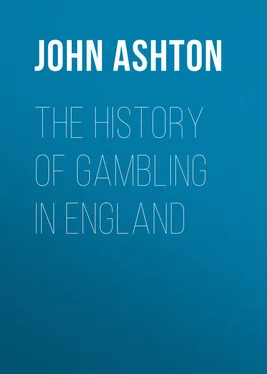John Ashton - The History of Gambling in England
Здесь есть возможность читать онлайн «John Ashton - The History of Gambling in England» — ознакомительный отрывок электронной книги совершенно бесплатно, а после прочтения отрывка купить полную версию. В некоторых случаях можно слушать аудио, скачать через торрент в формате fb2 и присутствует краткое содержание. Жанр: foreign_antique, foreign_prose, на английском языке. Описание произведения, (предисловие) а так же отзывы посетителей доступны на портале библиотеки ЛибКат.
- Название:The History of Gambling in England
- Автор:
- Жанр:
- Год:неизвестен
- ISBN:нет данных
- Рейтинг книги:5 / 5. Голосов: 1
-
Избранное:Добавить в избранное
- Отзывы:
-
Ваша оценка:
- 100
- 1
- 2
- 3
- 4
- 5
The History of Gambling in England: краткое содержание, описание и аннотация
Предлагаем к чтению аннотацию, описание, краткое содержание или предисловие (зависит от того, что написал сам автор книги «The History of Gambling in England»). Если вы не нашли необходимую информацию о книге — напишите в комментариях, мы постараемся отыскать её.
The History of Gambling in England — читать онлайн ознакомительный отрывок
Ниже представлен текст книги, разбитый по страницам. Система сохранения места последней прочитанной страницы, позволяет с удобством читать онлайн бесплатно книгу «The History of Gambling in England», без необходимости каждый раз заново искать на чём Вы остановились. Поставьте закладку, и сможете в любой момент перейти на страницу, на которой закончили чтение.
Интервал:
Закладка:
The History of Gambling in England
INTRODUCTORY
Difference between Gaming and Gambling – Universality and Antiquity of Gambling – Isis and Osiris – Games and Dice of the Egyptians – China and India – The Jews – Among the Greeks and Romans – Among Mahometans – Early Dicing – Dicing in England in the 13th and 14th Centuries – In the 17th Century – Celebrated Gamblers – Bourchier – Swiss Anecdote – Dicing in the 18th Century.
Gaming is derived from the Saxon word Gamen , meaning joy , pleasure , sports , or gaming – and is so interpreted by Bailey, in his Dictionary of 1736; whilst Johnson gives Gamble — to play extravagantly for money , and this distinction is to be borne in mind in the perusal of this book; although the older term was in use until the invention of the later – as we see in Cotton’s Compleat Gamester (1674), in which he gives the following excellent definition of the word: – “ Gaming is an enchanting witchery , gotten between Idleness and Avarice : an itching disease, that makes some scratch the head, whilst others, as if they were bitten by a Tarantula , are laughing themselves to death; or, lastly, it is a paralytical distemper, which, seizing the arm, the man cannot chuse but shake his elbow. It hath this ill property above all other Vices, that it renders a man incapable of prosecuting any serious action, and makes him always unsatisfied with his own condition; he is either lifted up to the top of mad joy with success, or plung’d to the bottom of despair by misfortune, always in extreams, always in a storm; this minute the Gamester’s countenance is so serene and calm, that one would think nothing could disturb it, and the next minute, so stormy and tempestuous that it threatens destruction to itself and others; and, as he is transported with joy when he wins, so, losing, is he tost upon the billows of a high swelling passion, till he hath lost sight, both of sense and reason.”
Gambling , as distinguished from Gaming , or playing, I take to mean an indulgence in those games, or exercises, in which chance assumes a more important character; and my object is to draw attention to the fact, that the money motive increases, as chance predominates over skill. It is taken up as a quicker road to wealth than by pursuing honest industry, and everyone engaged in it, be it dabbling on the Stock Exchange, Betting on Horse Racing, or otherwise, hopes to win, for it is clear that if he knew he should lose, no fool would embark in it. The direct appropriation of other people’s property to one’s own use, is, undoubtedly, the more simple, but it has the disadvantage of being both vulgar and dangerous; so we either appropriate our neighbour’s goods, or he does ours, by gambling with him, for it is certain that if one gains, the other loses. The winner is not reverenced, and the loser is not pitied. But it is a disease that is most contagious, and if a man is known to have made a lucky coup , say, on the Stock Exchange, hundreds rush in to follow his example, as they would were a successful gold field discovered – the warning of those that perish by the way is unheeded.
Of the universality of gambling there is no doubt, and it seems to be inherent in human nature. We can understand its being introduced from one nation to another – but, unless it developed naturally, how can we account for aboriginals, like the natives of New England, who had never had intercourse with foreign folk, but whom Governor Winslow 1 1 Good News from New England… Written by E. W. Lon. 1624.
describes as being advanced gamblers. “It happened that two of their men fell out, as they were in game (for they use gaming as much as anywhere; and will play away all, even the skin from their backs; yea, and for their wives’ skins also, although they may be many miles distant from them, as myself have seen), and, growing to great heat, the one killed the other.” 2 2 See Longfellow’s Hiawatha , for Indian gambling.
The antiquity of gambling is incontestable, and can be authentically proved, both by Egyptian paintings, and by finding the materials in tombs of undoubted genuineness; and it is even attributed to the gods themselves, as we read in Plutarch’s Ἰσιδος και Ὀσιριδος “Now the story of Isis and Osiris, its most insignificant and superfluous parts omitted, is thus briefly narrated: – Rhea, they say, having accompanied with Saturn by stealth, was discovered by the Sun, who, hereupon, denounced a curse upon her, that she should not be delivered in any month or year . Mercury, however, being likewise in love with the same goddess, in recompense for the favours which he had received from her, plays at tables with the Moon, and wins from her the seventieth part of each of her illuminations; these several parts, making, in the whole, five new days, he afterwards joined together, and added to the three hundred and sixty, of which the year formerly consisted: which days are even yet called by the Egyptians, the Epact , or Superadded , and observed by them as the birth days of their Gods.”
But to descend from the sublimity of mythology to prosaic fact, we know that the Egyptians played at the game of Tau , or Game of Robbers, afterwards the Ludus Latrunculorum of the Romans, at that of Hab em hau , or The Game of the Bowl , and at Senat , or Draughts . Of this latter game we have ocular demonstration in the upper Egyptian gallery of the British Museum, where, in a case containing the throne, &c., of Queen Hatasu (b. c. 1600) are her draught board, and twenty pieces, ten of light-coloured wood, nine of dark wood, and one of ivory – all having a lion’s head. These were all, probably, games of skill; but in the same case is an ivory Astragal, the earliest known form of dice, which could have been of no use except for gambling. The Astragal, which is familiarly known to us as a “knuckle bone,” or “huckle bone,” is still used by anatomists, as the name of a bone in the hind leg of cloven footed animals which articulates with the tibia, and helps to form the ankle joint. The bones used in gambling were, generally, those of sheep; but the Astragals of the antelope were much prized on account of their superior elegance. They also had regular dice, numbered like ours, which have been found at Thebes and elsewhere; and, although there are none in our national museum, there are some in that of Berlin; but these are not considered to be of great antiquity. The Egyptians also played at the game of Atep , which is exactly like the favourite Italian game of Mora, or guessing at the number of fingers extended. Over a picture of two Egyptians playing at this gambling game is written, “Let it be said”: or, as we might say, “Guess,” or “How Many?” Sometimes they played the game back to back, and then a third person had to act as referee.
The Chinese and Indian games of skill, such as Chess, are of great antiquity; but, perhaps, the oldest game is that of Enclosing , called Wei-ki in Chinese, and Go in Japanese. It is said to have been invented by the Emperor Yao, 2300 b. c., but the earliest record of the game is in 300 b. c. It is a game like Krieg spiel , a game of war. There are not only typical representatives of the various arms, but the armies themselves, some 200 men on each side; they form encampments, and furnish them with defences; and they slay, not merely a single man, as in other games, but, frequently, hosts of men. There is no record of its being a gambling game, but the modern Chinese is an inveterate gambler.
Читать дальшеИнтервал:
Закладка:
Похожие книги на «The History of Gambling in England»
Представляем Вашему вниманию похожие книги на «The History of Gambling in England» списком для выбора. Мы отобрали схожую по названию и смыслу литературу в надежде предоставить читателям больше вариантов отыскать новые, интересные, ещё непрочитанные произведения.
Обсуждение, отзывы о книге «The History of Gambling in England» и просто собственные мнения читателей. Оставьте ваши комментарии, напишите, что Вы думаете о произведении, его смысле или главных героях. Укажите что конкретно понравилось, а что нет, и почему Вы так считаете.












